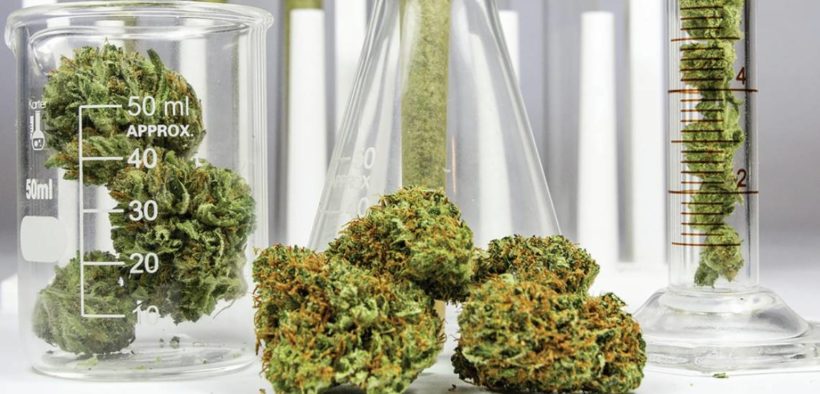Weed Out Cancer Pain

India may soon have legal medicinal cannabis as Indian scientists study two cannabis-derived compounds to treat epilepsy, sickle-cell anaemia, and cancer.
By Aatika H Jain
Here is a heartening prospect for lakhs of Indian patients battling cancer: medicinal cannabis might soon be legal in the country. Cannabis-based products have been known, through anecdotal evidence, to alleviate some types of chronic pain. A group of researchers from the Indian Institute of Integrative Medicine (IIIM) has requested approval for human clinical trials to check the efficacy of cannabis derivatives in managing diseases such as cancer, epilepsy and sickle-cell anemia. Tetrahydrocannabinol (THC) and cannabidiol (CBD) are the two cannabis compounds that are under study.
Cannabis-based drugs have the potential to meet the unmet needs of terminally-ill cancer patients and of those suffering from epilepsy and sickle-cell anaemia, a hereditary disease that afflicts nearly two crore tribal people living mainly in central states, says Dr. Ram Vishwakarma, Director, IIIM, Jammu. IIIM is a division of the Council of Scientific and Industrial Research (CSIR). The Narcotic Drugs and Psychotropic Substances (NDPS) Act, 1985 bans the recreational use of cannabis in India while the edible concoction called bhang is permitted in a number of states.
In a first in the country, IIIM was granted the license to cultivate and study the medicinal value of cannabis in partnership with Bombay Hemp Company (BOHECO) around a year ago. “We’re trying to generate medical evidence to justify the use of cannabis derivatives,” explains Dr. Vishwakarma. “There is a lot of misconception about cannabis owing mainly to its abuse because of its psychotropic component, THC. But the two compounds are also very effective for pain relief. For effective pain relief for cancer patients, both the components are needed as one is effective for pain originating in the central nervous system and the other for the pain of the peripheral nervous system.”

Animal trials have shown positive results so far and the drug is all set for clinical human trials. Researchers plan to conduct randomized trials on cancer patients at Tata Memorial Centre (TMC), Mumbai. The patients will be provided with these derivatives along with their approved treatment to evaluate its pain management and antiemetic qualities. The epilepsy trials will be carried out at AIIMS, Delhi and the sickle-cell anemia trials at Sickle Cell Institute, Chattisgarh, for the efficacy of the compounds.
Also read about
The US Food and Drug Administration gave its approval to the first cannabis-derived medicine last June. This was to be used for treating seizures associated with two severe and rare types of epilepsy. The increasing substantiation of efficacy and safety of medicinal cannabis in the treatment of cancer, a rare and severe type of epilepsy and multiple sclerosis has given an impetus to the clinical trials of derivatives of cannabis in India.
Cancer patients are now prescribed opioid drugs such as morphine and fentanyl. Opioids are derivatives of opium poppy seeds. In contrast to opioids, cannabidiol-based drugs are less habit-forming and could be a potential substitute. There are apprehensions among specialists that clinical trials of derivatives, which are already approved in other countries, would only result in their delayed accessibility to Indian patients, like in the case of the US FDA approved the cannabis-based drug for severe types of epilepsy. They opine that these medicines should be made available to Indian patients as quickly as possible.
A group of researchers from Indian Institute of Integrative Medicine has requested approval for human clinical trials to check the efficacy of cannabis derivatives in managing diseases such as cancers, epilepsy and sickle-cell anaemia.

Experts believe there is a need to standardize cannabis varieties to get predictable outputs of its medicinal derivatives and improve clinical research. Standard product development from standard cannabis strains is required too. IIIM intends to partner with the government to license cannabis cultivation, like opium, under the NDPS Act. Along with studying the pain management properties of cannabis, TMC oncologists would also like to check the derivative’s effect on cancer surgery outcome. “Cannabis brings about a state of bliss. We’re trying to ask whether this can occur at the level of cells. Can we push tumor cells into a state of relative inactivity just ahead of surgery?” says Dr. R A Badwe, Director, TMC. “There is evidence from another molecule that can influence outcomes positively.” The drug seems to hold a cocktail of medicinal properties in its fold, and accelerated trials can spell relief for the terminally-ill sooner rather than later.
















